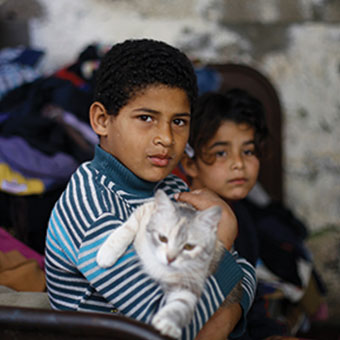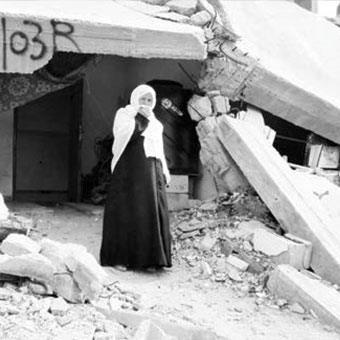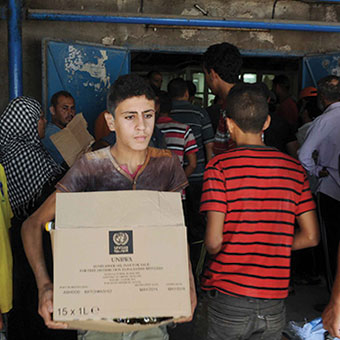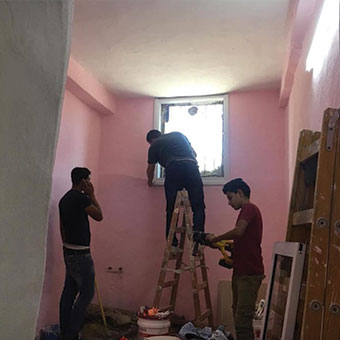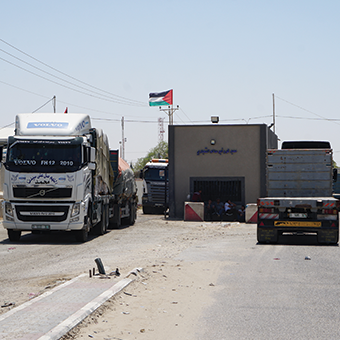المساهمة المدفوعة والمخصصة لمكتب الأمم المتحدة لتنسيق الشؤون الإنسانية في الأرض الفلسطينية المحتلة
Year:
| Donors | USDD |
|---|---|
| Requirements for 2025 | 12,243,215 |
| Earmarked Contributions | 0 |

|
208,333 |

|
671,618 |

|
64,683 |
| Opening Balance ** | 0 |
| Total (Contributions + Opening Balance) *** | 944,634 |
| Funding (%) | 8 |
| Donors providing unearmarked contributions in 2025 | |
 Australia  Belgium  Denmark  Estonia  Finland  Germany  Iceland  Ireland  Luxembourg  Netherlands  Norway .png) Private Contributions (Pinnacle Structures Inc)  Qatar  Singapore .png) Sweden (MFA)  Switzerland .png) United Kingdom (FCDO) |
|
| Notes | |
| *Unearmarked contributions (or “commitments”) are those for which the donor does not require the funds to be used for a specific project, sector, crisis or country, leaving OCHA to decide how to allocate the funds. | |
| ** May include unearmarked and earmarked funding with implementation dates beyond the calendar year. | |
| *** Excludes miscellaneous income (e.g. adjustments, gain/losses on exchange rate etc.) | |
| **** Funding information from the OCHA Contributions Tracking System. | |
In 2018, thanks to the support of our donors, OCHA:
- Played a key role in facilitating and supporting the HRP development process for 2019, which marks the second year of the multi-year 2018-2020 Humanitarian Response Strategy. This plan ensured the most effective and needs-based use of resources in a context where humanitarian needs outweigh available funding. OCHA coordinated, facilitated and produced a high quality 2019 HNO document which was endorsed and published in Dec 2018.
- Supported the HC in developing and launching a record high of 7 allocations through the oPt Country-Based-Pooled-Fund. The Fund has funded 52 projects for a total of US$ 21 million implemented by 34 partners. It reached 160% of the target and received US$ 32 million. It has also launched the “success story” feature that is published every month on the OCHA oPt website about the impact the projects have on the lives of the beneficiaries. 7 success stories have been published in 2018.
- Managed two CERF grants from the rapid response window to respond to the serious impacts stemming from the GRM in Gaza, to jump-start emergency operations in health and mental health, and psychosocial sector but also for emergency food needs of Palestine refugee populations in Gaza and the West Bank.
- Provided critical support to the Humanitarian Coordinator in generating global attention to the worsened crisis in Gaza and to raise awareness of the serious humanitarian impact stemming from “Great March of Return” mass demonstrations. 25 public statements were drafted, along with media outreach activities with 16 journalists from international (e.g. AFP, AP, BBC, CNN) and local press agencies (e.g. Jerusalem Post, KAN, Time of Israel). 253 tweets were published promoting IHL and IHL in the oPt.
- Coordinated advocacy that results in six HCT joint/coordinated briefings, and draft an action plan with OHCHR and other agencies to strategize HCT advocacy efforts on the issue of shrinking space in the oPt. OCHA played a critical secretarial role in facilitating and supporting private and public advocacy activities around the drivers of humanitarian need in oPt carried out at capital, local, and public levels, as well as through social media and communication with communities. 160 briefings were delivered, the private notes to the Palestinian PM’s office and continuous sharing of the AWG.
- Provided secretariat support to the HCT members. A total of eight meetings were held in 2018 and al 2018 action points were followed up through.
- At the inter-cluster coordination level, OCHA continued to regularly support and attend all cluster meetings and functions in the West Bank and Gaza through the provision of contextual analysis and evidence-based reporting on trends and areas with the highest vulnerability. In the West Bank, support was provided on demolition of homes, Israeli settler violence, restricted access to agricultural land etc. It also assisted the education cluster in mapping schools in Area C and East Jerusalem at risk of demolition and mapping post-displacement movement trends. It also developed and updated the community-level Emergency Response Plans for communities at high risk of mass displacement. In Gaza, OCHA continued to support preparedness actions focucing on IDPs, mapping critical facilities and lifesaving services, organizing an ISCP simulation exercise, etc.
- Provided secretariat support to the inter-agency PSEA network to operationalize its commitments in the oPt. Three network meetings were held in 2018 along with a mapping of the PSEA efforts. An action plan with priority actions was drafted for 2019 which will be endorsed in 2019.
- Played a leading role in the roll-out of the IASC Gender and Age Marker in the 2019 planning cycle, which reaffirms the HCT’s commitment to gender mainstreaming as a means for ensuring the highest quality of humanitarian programming.
- OCHA participated in one course (OSOCC Operations Course in Israel), co-facilitated one tripartite meeting (Professional Dialogue Meeting in Cyprus) and one workshop (International Assistance Awareness Workshop in Jordan) in the framework of the JIP.
- OCHA also engaged in operational preparedness discussions with Israeli military and civil emergency authorities at Erez, discussing issues pertaining to e.g. access, facilities, and liaison focal points.
- With the Palestinian authorities, OCHA has maintained discussions with technical-level actors in Gaza on operational preparedness and coordination, roles and responsibilities, and familiarization with the inter-agency processes (e.g. contingency planning).
- OCHA continued its discussion with the Palestinian NGO Network (PNGO): Training was provided on the cluster system, the humanitarian architecture and protection mainstreaming. Meetings were facilitated to ensure regular dialogue and follow up with NGO partners; support was provided to the East Jerusalem Task Force, including the delivery of targeted presentations on key issues of concern in East Jerusalem and follow up with task force members to support coordinated analysis. Support was also provided to the Area C Meetings.
- OCHA supported partners in country such as support to UNFPA to develop GBV quarterly monitoring database and dashboard, design of the Palestine Water Authorities’ annual report; map the status of mobile clinics in Ara C for Health Cluster and provide technical support to PCBS to digitalize and disseminate their census. OCHA also provided technical support to the Ministry of Social Development in Gaza on conducting multispectral needs assessment.
In 2017, thanks to the support of our donors, OCHA:
-
Coordinated the development of the 2018-2020 Humanitarian Response Strategy and 2018 Humanitarian Response Plan. The 2018 HNO document was also developed under the coordination of OCHA oPt. The country office also coordinated the development of the Gaza Urgent Funding Appeal at mid-year.
- Supported resource mobilization efforts on behalf of the humanitarian community in oPt. The 2017 HRP received $259.1 million out of the $551.9 million requested (47 per cent). A Central Emergency Response Fund (CERF) rapid response grant was secured in August 2017 to respond to the deteriorating situation in Gaza. Throughout the year, the oPt Humanitarian Fund (oPt HF) allocated funding to 43 projects, for a total value of $11.7 million, addressing urgent needs in Gaza (73 per cent) and the West Bank (27 per cent). The HF projects focused on education, emergency shelter and non-food items, water, sanitation and hygiene, protection, food security and health.
- Facilitated and led inter-cluster efforts to mainstream cross-cutting issues throughout the Humanitarian Programme Cycle and across the core functions of coordination, advocacy, information management, and humanitarian financing. This included mainstreaming of protection, gender, and community engagement and accountability to affected populations.
- Carried out vulnerability profiling of 46 Palestinian Bedouin/Herder communities in the central West Bank, designed to quantify sectoral needs. The Vulnerability Profile dashboard that was published as a result of this assessment of the 46 communities is an online tool designed to visualize the key findings of this comprehensive dataset.
- Provided 184 humanitarian briefings and field visits, reaching 2,326 people, including elected representatives, diplomats, humanitarian partners and members of civil society.
- Supported the humanitarian advocacy function of the Humanitarian Coordinator, which included the issuing of 10 public statements expressing concern or raising awareness about humanitarian issues.
- Published innovative and highly sought-after information management products, including regular and ad hoc reports, maps and online databases.
- Worked towards enhancing preparedness and disaster risk management, including supporting disaster preparedness and emergency response systems at local and community level.
In 2016, thanks to the support of our donors, OCHA:
- Coordinated the fifteenth Response Plan for the oPt (HRP 2017). The 2016 plan secured $285 million of the $571 million requested (50%).
- Revamped the West Bank Demolitions and Displacement system to reflect information at the household level with data disaggregated by types of structures (including donor-funded humanitarian assistance) and people displaced, along with geographic location and a description of each incident.
- Strengthened gender focus across the various core functions of coordination, advocacy, information management, humanitarian financing and policy and standards on gender equality in humanitarian action.
- Coordinated the Humanitarian Needs Overview, which includes needs data disaggregated by governorate/area, and benefitted from common datasets such as the VPP+ and IDP survey which allowed data to be compared across clusters/sectors.
- Held around 157 humanitarian briefings and field visits, reaching 1,951 decision makers, elected representatives, diplomats, humanitarian partners and members of civil society.
- Supported the Humanitarian Coordinator’s advocacy, which included the issuing of 13 statements expressing concern or raising awareness over a number of humanitarian issues.
- Worked towards enhancing preparedness and disaster risk management, including supporting disaster preparedness and emergency response systems at local and community level.
- Published innovative and highly sought after information management products, including maps and online databases.
In addition, the OCHA-managed Humanitarian Fund (oPt HF) assisted during 2016 in enabling partners to reach 536,669 people via the implementation of 29 projects throughout Gaza and the West Bank. 17.2% of projects were implemented directly by national NGOs and 51.7% in partnership with international NGOs and UN agencies. The oPt HF projects were funded through the United Nations / Humanitarian Fund (UN/HF), with the generous support of Belgium, Germany, Ireland, Norway, Spain, Sweden and Switzerland.
In 2015, thanks to the support of our donors, OCHA:
- Coordinated the fourteenth Response Plan for the oPt (HRP 2016). The 2015 plan secured $347 million of the $705 million requested (49%).
- Coordinated the 2015 Vulnerability Profile Plus, a multi-cluster/ multi-partner nationwide vulnerability assessment that captured information on a wide range of humanitarian indicators, in partnership with the Palestinian Central Bureau of Statistics (PCBS) and clusters.
- Led the IDP re-registration and vulnerability profiling exercise which provided in-depth analysis of the current living situation and vulnerabilities of the 75,000 people who remained displaced after the 2014 conflict at the time of the survey.
- Coordinated the Humanitarian Needs Overview, which was underpinned by the Vulnerability Profile Plus, IDP re-registration and vulnerability profiling exercise and numerous cluster sources.
- Held around 140 humanitarian briefings and field visits, reaching some 1,900 decision makers, elected representatives, diplomats, humanitarian partners and members of civil society.
- Supported the Humanitarian Coordinator’s advocacy, which included the issuing of 14 statements expressing concern or raising awareness over a number of humanitarian issues.
- Worked towards enhancing preparedness and disaster risk management, including supporting disaster preparedness and emergency response systems at local and community level.
- Published numerous innovative and highly sought after information management products, including the Humanitarian Atlas of the oPt.
